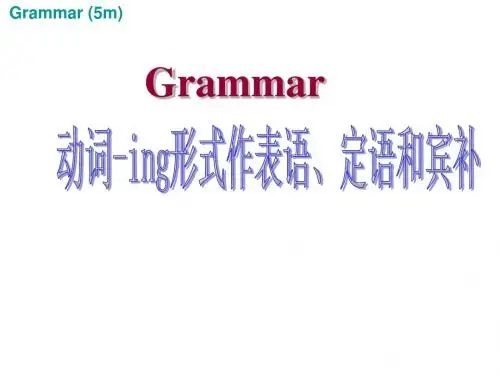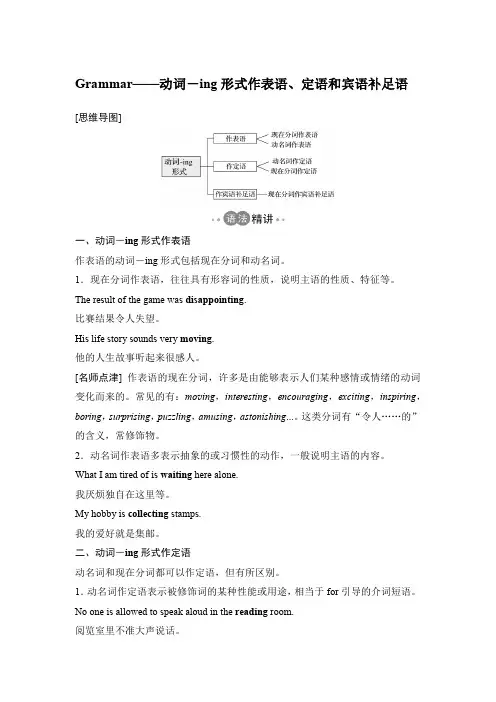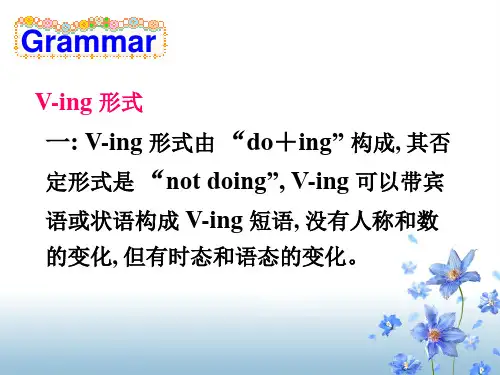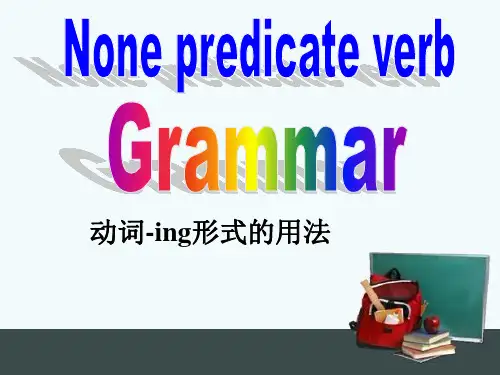Grammar 动词的ing形式作定语、表语和宾语补足语
- 格式:doc
- 大小:53.00 KB
- 文档页数:3



Grammar——动词-ing形式作表语、定语和宾语补足语[思维导图]一、动词-ing形式作表语作表语的动词-ing形式包括现在分词和动名词。
1.现在分词作表语,往往具有形容词的性质,说明主语的性质、特征等。
The result of the game was disappointing.比赛结果令人失望。
His life story sounds very moving.他的人生故事听起来很感人。
[名师点津] 作表语的现在分词,许多是由能够表示人们某种感情或情绪的动词变化而来的。
常见的有:mo v ing,interesting,encouraging,exciting,inspiring,boring,surprising,puzzling,amusing,astonishing...。
这类分词有“令人……的”的含义,常修饰物。
2.动名词作表语多表示抽象的或习惯性的动作,一般说明主语的内容。
What I am tired of is waiting here alone.我厌烦独自在这里等。
My hobby is collecting stamps.我的爱好就是集邮。
二、动词-ing形式作定语动名词和现在分词都可以作定语,但有所区别。
1.动名词作定语表示被修饰词的某种性能或用途,相当于for引导的介词短语。
No one is allowed to speak aloud in the reading room.阅览室里不准大声说话。
2.现在分词作定语时,它和被修饰词之间有逻辑上的主动关系,表示所修饰词进行的动作,相当于一个定语从句。
The boy playing football on the playground is my younger brother.=The boy that/who is playing football on the playground is my younger brother.在操场上踢足球的那个男孩是我弟弟。



Grammar 动词的-ing形式作定语、表语和宾语补足语一、作定语:动词的-ing形式作定语时起下列作用:1.说明被修饰名词的功能或用途,这时,一般是单个v.-ing 而不是短语,放在被修饰的名词前面。
可以转换成“for + v.-ing”短语修饰该名词。
这时的v.-ing是动名词。
e.g. a sleeping bag = a bag for sleeping 睡袋a reading room = a room for reading 阅览室a drinking cup = a cup for drinking饮用杯a writing desk = a desk for writing写字台a washing machine 洗衣机a swimming pool 游泳池a dancing hall 舞厅2.说明名词的动作、特征、或性质。
这时的v.-ing 是现在分词,它与被修饰的名词是逻辑上的主动关系。
①单个的现在分词作定语时放在被修饰名词的前面,常可转换成定语从句。
e.g. a sleeping boy = a boy who is sleepinga drinking horse = a horse which is drinkinga moving story = a story which moves peoplea terrifying sound = a sound which terrifies peoplean inspiring leader = a leader who inspires people②现在分词短语作定语时要后置,即放在被修饰名词的后面。
常可转换成定语从句。
e.g. The girl swimming in the river (who is swimming in the river) is good at dancing.Do you know the man standing / (who is standing ) at the door?The boy studying / (who is studying) in the classroom is our monitor.*作定语用的v.-ing 是动名词还是现在分词并不重要。
Grammar——动词ing形式语法图解探究发现①Learning without thinking leads to confusion; thinking without learning ends in danger.②Being exposed to sunlight for too much time will do harm to one's skin.③I'm sorry for having kept you waiting so long.④Seeing that she was going off to sleep, I asked if she'd like that little doll on her bed.⑤Some teachers might be angry for not having been informed in advance.[我的发现]1.动词ing形式由“do+ing”构成。
2.动词ing形式的否定形式直接在前面加not。
3.动词ing形式有一般式、完成式、一般被动式和完成被动式四种。
一、概念形式所作句子成分意义(not) doing主语、宾语、表语;定语、状语、宾语补足语主动(not) having done 宾语;状语主动being done 主语、宾语;后置定语(表示正在被做) 被动having been done 宾语;状语被动[即时演练1] 用所给动词的适当形式填空①The young men rose and returned into the sitting room, while the old man, again apologizing (apologize), left by another door.②I heard my parents quarrelling (quarrel) in the bedroom last night.二、用法1.作状语(1)doing表示主动的动作,可以表示原因、条件、伴随等。
Part ⅡGrammar——动词-ing形式作表语、定语和宾语补足语[思维导图]一、动词-ing形式作表语作表语的动词-ing形式包括现在分词和动名词。
1.现在分词作表语,往往具有形容词的性质,说明主语的性质、特征等。
The result of the game was disappointing.比赛结果令人失望。
His life story sounds very moving.他的人生故事听起来很感人。
[名师点津]作表语的现在分词,许多是由能够表示人们某种感情或情绪的动词变化而来的。
常见的有:moving,interesting,encouraging,exciting,inspiring,boring,surprising,puzzling,amusing,astonishing...这类分词有“令人……的”的含义,常修饰物。
2.动名词作表语多表示抽象性的或习惯性的动作,一般说明主语的内容。
What I am tired of is waiting here alone.我厌烦独自在这里等。
My hobby is collecting stamps.我的爱好就是集邮。
二、动词-ing形式作定语动名词和现在分词都可以作定语,但有所区别。
1.动名词作定语表示被修饰词的某种性能或用途,相当于for引导的介词短语。
No one is allowed to speak aloud in the reading room.阅览室里不准大声说话。
2.现在分词作定语时,它和被修饰词之间有逻辑上的主动关系,表示所修饰词进行的动作,相当于一个定语从句。
The boy playing football on the playground is my younger brother.=The boy that/who is playing football on the playground is my younger brother.在操场上踢足球的那个男孩是我的弟弟。
动词-ing形式作主语和宾语语境自主领悟先观察原句后自主感悟①Since then,finding ways to grow more rice hasbeen his life goal.②As a young man,he saw the great need forincreasing the rice output.③Yuan Longping searched for a way to increaserice harvests without expanding the area of the fields.④However,he doesn't care about being famous.⑤He enjoys listening to violin music,playing mah-jong,swimming and reading.⑥Spending money on himself or leading a comfortable life also means very little to him.⑦He awoke from his dream with the hope of producing a kind of rice that could feed more people. 1.以上动名词短语(加黑部分)在句中作主语的是①,⑥。
2.作动词宾语的是⑤。
3.作介词(短语)宾语的是②,③,④,⑦。
1.动词-ing形式是动词的一种非谓语形式,包括现在分词和动名词两种。
动词-ing形式在句中的语法作用:动名词在句中作主语、宾语、表语和定语,现在分词在句中作状语、宾语补足语和定语。
2.动词-ing形式的时态和语态:语态时态主动语态被动语态一般式doing being done完成式having done having been done Reading aloud is a good way to learn a language.大声朗读是学习语言的一种好方法。
Grammar 动词的-ing形式作定语、表语和宾语补足语一、作定语:动词的-ing形式作定语时起下列作用:1.说明被修饰名词的功能或用途,这时,一般是单个v.-ing 而不是短语,放在被修饰的名词前面。
可以转换成“for + v.-ing”短语修饰该名词。
这时的v.-ing是动名词。
e.g. a sleeping bag = a bag for sleeping 睡袋a reading room = a room for reading 阅览室a drinking cup = a cup for drinking饮用杯a writing desk = a desk for writing写字台a washing machine 洗衣机a swimming pool 游泳池a dancing hall 舞厅2.说明名词的动作、特征、或性质。
这时的v.-ing 是现在分词,它与被修饰的名词是逻辑上的主动关系。
①单个的现在分词作定语时放在被修饰名词的前面,常可转换成定语从句。
e.g. a sleeping boy = a boy who is sleepinga drinking horse = a horse which is drinkinga moving story = a story which moves peoplea terrifying sound = a sound which terrifies peoplean inspiring leader = a leader who inspires people②现在分词短语作定语时要后置,即放在被修饰名词的后面。
常可转换成定语从句。
e.g. The girl swimming in the river (who is swimming in the river) is good at dancing.Do you know the man standing / (who is standing ) at the door?The boy studying / (who is studying) in the classroom is our monitor.*作定语用的v.-ing 是动名词还是现在分词并不重要。
重要的是要掌握v.-ing 做定语的用法。
实际上,当代一些著名语法专家已把动名词和现在分词统称为v.-ing 分词而不予细分了。
二、作表语:动词的-ing 形式作表语时起下列作用:1.说明主语的内容,可换到句首做主语。
这时的v-ing 形式是动名词。
e.g. The real problem is getting to know the needs of people.Her job is teaching children to dance. = Teaching children to dance is her job.2.说明主语的特征。
这时的v.-ing 形式是现在分词。
它与主语是逻辑上的主动关系,意思是“使人...... 的”e.g. The situation is encouraging.What he said just now is confusing. (confuse).The news is shocking. (shock).能这样用的现在分词最常见的还有:astonishing, amusing, confusing, disappointing, boring, encouraging, inspiring, moving, tiring, interesting, surprising, charming, exciting, missing, puzzling, frightening...三、作宾语补足语:动词的-v.-ing形式能跟在宾语后面,对其作补充说明,因此称为宾语补足语,通常简称为“宾补”。
1. 这时的v.-ing 形式是现在分词,它与宾语是逻辑上的主动关系。
e.g. When I arrived at the reading room, I found many students reading carefully there.Children like to watch the PLA men training (train) on the drill-ground.Don’t you see a girl running (run) towards us?2.动词的-ing形式作宾语补足语,主要用于以下两类动词后:①表示感觉和心理状态的动词:see, hear, feel, smell, watch, find, listen to, notice, observe 等。
e.g. When we returned, we found a stranger standing in front of the house.Suddenly we heard someone knocking gently on the window.*在see, hear, feel, watch等感官动词后,既可用动词的-ing形式作宾补,也可以用省略to 的不定式作宾补。
用动词的-ing 形式时,表示动作正在进行;用省略to 的不定式时,表示动作从开始到结束的全过程。
e.g. I saw a boy getting on the bus. (表示动作正在进行)I saw a boy get on the bus. (表示动作的完成了)Do you hear someone knocking (knock) at the door? ( 表示动作正在进行)I heard someone knock at the door three times. ( 表示完整的动作)②表示使意义的使役动词:(have, let, keep, get, leave...) + sb./sth. + doing sth.e.g. We kept the fire burning all night long.I won’t have you running about in the room.[语法专练]I. 句型转换1. Do you know the boy who lies under the tree?. Do you know the boy lying under the tree?2.The picture that hangs on the wall is painted by my nephew.. The picture hanging on the wall is painted by my nephew.3.We can see that steam is rising from the wet clothes.. We can see steam rising from the wet clothes.4.Not until Jane got off the bus did she find her wallet was missing.. Not until Jane got off the bus did she find her wallet missing.5.Frank is very good at telling funny jokes. We are amused by him.. Frank is very good at telling funny jokes. He can be very amusing.II. 用括号所给词的正确形式填空。
1.Do you know the name of the play being put on (put on) now?2.Her job is keeping (keep) the lecture hall as clean as possible.3.Returning (return) to my apartment, I found my bag missing. (miss).4.Did you hear the dog downstairs barking (bark) for most of the night?5.A cook will be immediately fired if he is found smoking (smoke) in the kitchen.6.Helen had to shout to make (make) herself heard (hear) above the sound of the music.7.The bell indicating(indicate) the end of the period rang, interrupting(interrupt) our heated discussion8.The volleyball match was so exciting (excite) that we all got excited (excite) after watching it.9.We heard then quarreling (quarrel)about money after the concert. They looked very angry.10.The villagers saw the fire burning(burn) brightly in the distance. When they hurried there, they found some houses burned/burnt (burn) to the ground already.11.I don’t see anyone take (take) away your paper. It might have been flown by the wind.12.During the days to come (come) we’ll make food preparations for the sports meeting,13.Einstein was on of the greatest scientist respected (respect) by the people.14.We were all very surprised (surprise) at the news. I found it very surprising.15.He gave us an inspiring (inspire) speech. We were all inspired (inspire).III. 单句改错1.I was confusing by his strange questions.confused2.The dish smelt good was cooked by my mother.Smelling3.The boy went home, sad with his money stealing.stolen4.He was so thirsty that he drank a lot of boiling water.boiled5.Looking at his exciting look, I knew he hadn’t calmed himself down.excited6.I am looking forward to visit Charlie Chaplin Museum in Switzerland next week.visiting7.Charlie’s nonverbal humor often makes people bursting with laughter.burst。